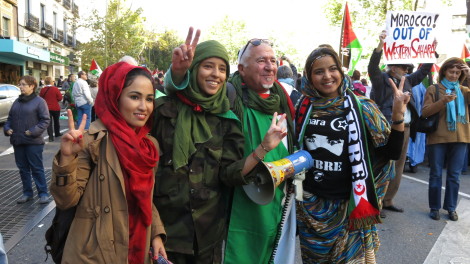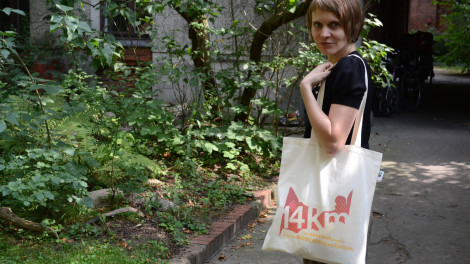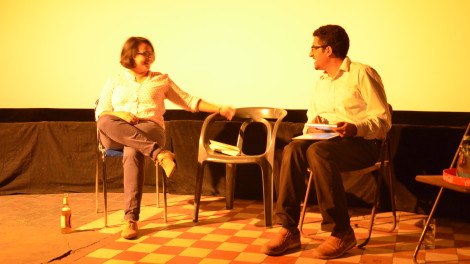Monthly Archives: September 2015
“I am very happy to have found this internship” – Michael reports from SMEX in Beirut
My name is Michael and I am currently enrolled in an internship working as a researcher and grant director with the Lebanese NGO SMEX - Social Media Exchange. I started in April 2015 and I will stay in Beirut until October. SMEX is a media advocacy and development organization based in Beirut. We provide on- and offline trainings for journalists and activists and advocate for human rights adapted to technology and the web throughout the MENA region. The founders Mohamad and Jessica are experienced and their work is very professional. I am very happy to have found this internship as I learn a lot about the way how local NGOs work, digital rights in the Arab region and social media tools for advocacy. Lebanon is a very interesting country with a lot of different and often opposing views within society - it gives me a lot of input to think about and to question assumptions I had before. “Unfortunately” a lot of people speak perfectly English, so my plan to really learn Arabic and French did not work out until now. The people are very nice and it is easy to engage with them and to do lots of different activities (hiking, cycling, beach, party, …). The safety situation is relatively good, but one should be aware of limitations within the country and some negatively affecting interior and exterior conditions which could change the current situation.
Western Sahara
14km Film- and Discussion Series
“LIFE IS WAITING – Referendum and Resistance in Western Sahara” (documentary, USA /Western Sahara 2015, original version with English subtitles, 59 min) by Iara Lee on Wednesday, 07th October 2015 at 6:45 p.m. (1845) at Filmrauschpalast, Lehrter Straße 35, 10557 Berlin-Moabit 14km.org presents the fifth evening screening of the 2015 “14km Film and Discussion Series.”: In her film, “LIFE IS WAITING – Referendum and Resistance in Western Sahara” (Arabic/Spanish/English/French with English subtitles), director Iara Lee documents how the Sahrawis, the local people of Africa’s last colony, Western Sahara, continue to struggle for their independence from Morocco despite it being promised by the former colonial power, Spain, over 40 years ago. Following the film screening, special guests will engage with the audience to discuss the independence movement and the current situation in Western Sahara. Attendance is free, donations are welcome. The event takes place at Filmrauschpalast cinema, on the 1st floor of the Kulturfabrik's backyard building in Berlin Moabit: Lehrter Straße 35, 10557 Berlin. The discussion ends at 22:00 (10 pm) at the latest. Facebook event Additional film informations The 14km Film and Discussion Series 2015 gets sponsorship by budgetary funds of the Federal State of Berlin – Office for Development Cooperation. Further events are scheduled as followed: 28 October / 18 November / 9 December The events are dedicatet to a single country or specific topic, in order to give an artistic-documentary impression . The ensuing audience discussion aims to include further informations by an affected person living in Berlin and by an scientific expert, always aiming to make links to North-South relationships. We express thanks for the support:
+++Now available: Specially designed 14km Jute bags!+++
Jute bags labelled with our motto "14km - The shortest distance between North Africa and Europe" are now available! We want to spread the message of just how close North Africa and Europe are to each other! It's a message that deserves more attention, especially now when so many people are fleeing the region and seeking refuge in Europe. We want to send a signal against xenophobia and to promote the building of bridges across these "14km." These fair-trade, hand-made jute bags are produced especially for you! You can purchase one (or more!) for 10 EUR* per bag at our next event, such as the 14km Film and Discussion Series. Alternatively, we can deliver if you pay the extra shipping costs - simply email info@14km.org to place and order. Buy a bag and wear a statement of just how close our cultures are! * By purchasing a 14km jute bag, you help support our non-profit, volunteer work.
The Difficulties of Doing Justice to Yemen in a Documentary
Film Screening: "Expedition Yemen - 126 Degrees in the Shade"
Two Swedes, a camel and the wide Yemeni desert – all set for an adventure. The third evening of our 14km Film and Discussion Series brought opposites together, not only on the screen, but also off it in the Filmrauschpalast filled to capacity with a diverse group of guests. After the film, Amal Nasser, Yemeni activist and co-founder of ArabHub Berlin, and Mohamed al-Thawr of "The Youth Initiative for a New Yemen", discussed stereotypes and diversity, as well as women's rights in contemporary Yemen. The film's Swedish director, Mikael Strandberg, is a passionate and experienced explorer. According to a friend speaking on his behalf, Strandberg's message to the audience was: "It's very hard to be in Yemen and not to fall in love with the country". However, whether his film succeeds in conveying this same message while portraying the diversity of the country and its people's needs, brought up a range of opinions in the ensuing discussion. An Adventurous Perspective The film is shot from the perspective of an adventurer looking directly into the director’s camera. Right from the introduction, the audience is prepared for an expedition, which they watch unravel over 60 minutes from the comfort of their armchairs. We first find the two exhausted explorers in the middle of the desert, seemingly stranded with their camel unwilling to continue. There seems to be no way forward. We are then transported back to the starting point of the journey in the capital, Sanaa. There, Mikael Strandberg and the journalist Tanya Holm are eagerly getting to know Yemeni society, meeting a Sheikh responsible for negotiations over a murder case. Strandberg is impressed by the good atmosphere among the hundreds of tribal members and their ability to resolve such a sensitive dispute, with neither aggression nor the assistance of the state institutions. He is less impressed, however, by the ever-present weapons and dangers of possible terrorist attacks. After that episode, we accompany Mikael and Tanya on their gruelling trek through the desert of the al-Mahra region, witnessing the generous hospitality with which the humble local villagers consistently greet them. The adventurers travel by foot in order to get as close as possible to the locals and to try and reciprocate their warmth and curiosity. By contrast, negative images of terrorists and rebel fighters with their attacks, kidnappings and hate speech, hardly appear in the film – they were simply not encountered during the 2012 journey. And that is a key message of the director: in contrast to the negative coverage of Yemen in the Western media, it is important to paint a positive picture that emphasises the normality of people above and beyond the country’s troubles with violence. Diversity versus Stereotypes Amal Nasser, invited to the post-film discussion as an expert on Yemen, was left unconvinced by Mikael Strindberg's portrait of Yemen. She points to the early scene portraying the gathering of armed men, or to that set in a Bedouin tent where Strandberg explains to his hosts the workings of a GPS device, as examples of the unbearable stereotypes of Yemenis reproduced even in this film. According to Amal, the film does not show the reality of 9-to-5 professionals or cafe visits among friends in the way they would be captured by local Yemeni directors. Mohamed al-Thawr, however, disagreed. For him, it is clear that the adventurer is looking for exciting snapshots, as he would expect to find them on a dangerous wilderness journey. Of course, there is another daily life in Yemen, but it is not so interesting to document. Exploring Yemen's diversity has been somewhat of a personal expedition for Mohamed al-Thawr, who has spent his whole life oscillating between Yemen and Germany. 25 per cent of Yemen's population in the 1960s were Yemeni Jews. To meet a few of those who are still living in Yemen, Mohamed made a contact through his father's hospital, travelled to the Jewish villages and invited the Yemeni Jews to a meeting in Sanaa. "After the masks have been lifted, you can see thousands of similarities ," remarked Mohamed al-Thawr on the impressive experience. Women in Yemen: Emancipated or without Rights? For Amal Nasser, the lived diversity of a society is closely related to the ability of women to move naturally in public space. Unfortunately, this, along with the representation of women in political office, is rare. Although there are female Yemeni politicians, many are entangled in a corrupt system and do not pursue political programmes on their own. This is in contrast to committed young activists pursuing social goals outside of the political system. The role of women in society represented a controversial topic during the demonstrations of 2011. Dr. Yahya al-Thawr, Mohamed's father, is convinced that Yemeni women are in fact "very emancipated" as demonstrated by their important role in the demonstrations along with the award of the Nobel Peace Prize to the female Yemeni activist and politician: Tawakkol Karman. Amal Nasser, by contrast, argued that Yemeni women protested as individuals, rather than on behalf of females. For her, it is unfortunately clear that most women in Yemen are oppressed, by fathers, brothers and other authority figures who constrain their free choices. As such, their primary struggle is to achieve their own rights as women, with other revolutionary goals a secondary interest. A Yemeni man in the audience agreed: "It is us men who say that women are supposedly equal in Yemen ". Yemen Today Today's violent situation in Yemen has extinguished the hopeful mood that permeated the country in 2011 after the overthrow of Ali Abdullah Saleh. "The war is a disaster," summarised Mohamed al-Thawr. But this declaration of love, as director Mikael Strandberg describes his film about Yemen, represents at least a small positive beacon amidst a sea of terrible events. Thanks to Amal Nasser and Mohamed al-Thawr for contributing to the fascinating discussion and for providing their interesting insights into the social and political situation in Yemen. Movie links: Film homepage Distribution Information Director’s comment Event Presentation and Moderation: Hussein Ben Amor On site coordination: Andreas Fricke Text: Susanne Kappe Translation: Alex Odlum Photos: Jana Vietze Programme: the 14km Volunteer Film Team The 14km Film and Discussion Series 2015 gets sponsorship by budgetary funds of the Federal State of Berlin – Office for Development Cooperation. The 14km Film Database offers an additional collection of films from and about Yemen, including shorts, documentaries and feature movies. The media collective "# Support Yemen" is producing videos like the short film "The Melody of our Alienation". You find a tv documentary made by interviews of yemeni women on the revolution. The upcoming Film and Discussion Event takes place on September 16th and will be about Sudan. Read more about the date and the film screening of "Darfur's Sceleton". Further events are scheduled as followed: 07 October / 28 October / 18 November / 9 December The events are dedicatet to a single country or specific topic, in order to give an artistic-documentary impression . The ensuing audience discussion aims to include further informations by an affected person living in Berlin and by an scientific expert, always aiming to make links to North-South relationships. We express thanks for the support:




